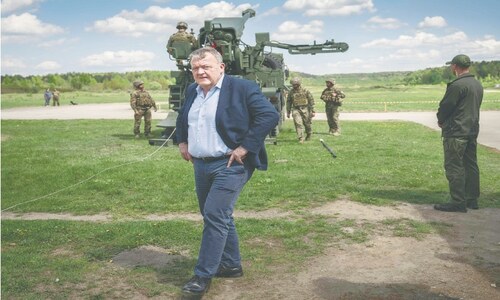JEDDAH: Ever since the seizure of two Israeli soldiers by Hezbollah sparked an Israeli offensive in Lebanon, Huda Fatani has set her alarm for 3:15 each morning, gotten up to perform her ablutions, then spent more than an hour on her knees praying for the success of Lebanese militia.
Despite her gruelling days at the King Fahd Hospital, where she works as a hematologist, Fatani said this was the least she could do to support the group fighting on behalf of all Arabs.
Hezbollah’s fight with Israel, viewed widely here as a battle between the militia’s David and the Jewish state’s Goliath, has solidified support for the militant group and left US credibility, already at an all-time low, in tatters. The conflict has highlighted how far apart the United States and the majority of Arabs stand on the most visceral conflict in the Middle East.
Arabs see the US refusal to press Israel, its ally, for a cease-fire as a clear bias toward the Jewish state and against Arabs. They also believe that US delivery of weapons to Israel makes the United States complicit in the deaths of civilians.
“The Palestinian government was kidnapped and jailed, Palestinians were being starved by Israel, and the US did not object,” said Fatani, 42, a mother of four. “But when Hezbollah captures soldiers to release prisoners, and Lebanon is attacked by Israel, instead of telling it to stop, the US rushes bombs and missiles so it can kill more Palestinians and Lebanese.”
The United States has blamed Hezbollah for provoking Israel, and Secretary of State Condoleezza Rice has said any peace plan should deal with the underlying problems causing violence in the region, a reference to Iranian and Syrian support for Hezbollah, an armed group potentially stronger than the Lebanese army.
But many Arabs say they think the United States has the equation backwards, that it is Israel’s occupation of Palestinian and Lebanese land, with US support, that fuels the conflict.
The United States’ Arab allies — Saudi Arabia, Jordan and Egypt — initially blamed Hezbollah for the violence, calling its seizure of the soldiers miscalculated adventures. But a high civilian death toll, widespread destruction in Lebanon and strong popular support for Hezbollah have forced a shift in their stance.
Egypt, one of a few Arab states with relations with Israel, said it was trying to resolve the crisis through contacts with the Jewish state, according to the Akhbar al-Yawm newspaper in Egypt. Saudi Arabia dispatched its top diplomats to Washington to press for a cease-fire, and when that failed, issued a strongly worded statement warning of the possibility of a wider regional conflict if Israel refused to exchange Arab land for peace and relations with Arab states.
Hezbollah, emerging as the new champion of the Palestinians, has managed, for the most part, to close sectarian ranks and win the support of Sunni majorities in most Arab countries.
Several Wahabi clerics in Saudi Arabia, however, have refused to support Hezbollah’s fight against Israel. They believe Shias are not proper Muslims.
The Website of a popular preacher, Nasser al-Omar, tells followers that contrary to Hezbollah’s claims, it is not fighting on behalf of Sunni Muslims in Palestine and is instead a tool in Iran’s hands.
But prominent and popular clerics in Egypt and Saudi Arabia have defended the militia, saying this was a time to remain united and bury sectarian animosities.
Arabs for the most part have celebrated Hezbollah’s attacks in Israel. “I was so happy,” Fatani, sitting at home in jeans watching Al-Jazeera, recalled feeling when she heard about Hezbollah strikes against Israel. “It was the first time in 50 years that Israelis feel what Palestinians and Lebanese have been going through.”
When Al-Jazeera announced a new Hezbollah strike on an Israeli chemical plant, she looked toward the sky and said, “God be praised,” then got down on the floor, her forehead to the carpet, and recited a short prayer of thanks. In demonstrations in Egypt, people carried posters of Hezbollah leader Hasan Nasrallah and the late Egyptian president Gamal Abdal Nasser, seen as the father of Arab nationalism.
Sabri, the Saudi student, said he wished he could demonstrate to express his anger at events or volunteer to fight in Lebanon, but that it was not allowed by the government.
So instead Sabri, who wears his long hair in a ponytail under a cream-and-orange turban, prays for Hezbollah’s victory and shows his support by driving around with a picture of Nasrallah taped on the back of his red and white Mini Cooper. If the authorities ask him to remove the picture, he said, he would replace it with a sign that reads, “God bless those who engage in miscalculated adventures.”—Dawn/Los Angeles Times News Service
















































Dear visitor, the comments section is undergoing an overhaul and will return soon.